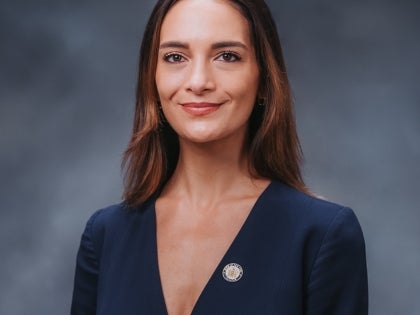
Lawmakers Propose Interstate Compact to Ban Taxpayer-Funded Giveaways to Corporations
February 14, 2019

Queens, New York – Today, State Senator Julia Salazar announced legislation that she is sponsoring with Assemblymember Ron Kim to end the practice of municipal and state governments enacting corporate welfare packages for specific companies in New York. Their proposal comes in the wake of the $3 billion deal offered to Amazon to locate its HQ2 in New York City, the announcement of which was met with sustained and forceful opposition by countless New Yorkers. Senator Salazar and Assemblymember Kim have been communicating with state legislators across the country on ways to end the practice of offering company-specific subsidies, especially given that no studies have shown a meaningful connection between such “economic development” programs and meaningful economic growth.
The bill would enact a collective agreement between all states that join to end the costly “Race to the Bottom” practice, which has cost many states billions annually in taxpayers’ money over several decades. Their colleagues in Illinois and Arizona have already introduced similar versions of the bill in their own state legislative bodies, and other lawmakers from states as far and diverse as Florida and Connecticut have expressed comparable support and intentions in the near future. Instead of helping large corporations extract wealth and resources from local neighborhoods, the lawmakers all agreed that it made far more sense to spend that money helping small businesses and working families in their local communities.
The legislation can be viewed here.
State Senator Julia Salazar, Chair of the Senate Standing Committee on Women's Issues, stated, “Economic development spending in New York is fundamentally broken, and despite the poor results of these policies, we persist in offering corporations blank checks without any accountability mechanism. With this interstate compact, we will stop the race to the bottom that companies have used to pit the working classes of different states against each other.”
Assemblymember Ron Kim said, “When municipalities and states bend over backwards for the chance to give billions to mega-companies, we all lose. In the last few decades, corporate welfare has extracted untold amounts of resources from our communities, money that could have been used to boost affordable housing, improve transportation infrastructure, and adequately fund our public school systems. It is time to end the practice of subsidizing multinational corporations without transparency, accountability, or results under the guise of economic development, and to start investing in the working families and small businesses that represent the lifeblood of our country.”
“It is so important for states to work together to ensure that we aren’t simply subsidizing profitable companies to entice them. It is always easy for a government official to throw money at an organization to get them to patriate their company there - but it ends up hurting everyone. That’s less money for schools and infrastructure and greater costs to residents. By working together states can ensure that we aren’t fighting each other, when we could be lifting each other up." – Connecticut State Representative Josh Elliot
“What we have seen over the last several years is a steady increase in the practice of states putting together very specific and very lucrative tax giveaways for highly publicized corporate relocations and expansions. While I can’t think of any state that doesn’t want increased economic development, at what point do we say enough is enough? No one wins when we compete against each other at the expense of mutually beneficial investments in our education system, health care and infrastructure network.” – Illinois Senator Toi W. Hutchinson
“Right now state governments are caught in a race to the bottom facilitated by major corporations who expect us to lure them into our states through incentives and subsidies. The sad reality is we have no choice— states across the country participate in this game, and it’s Americans who lose at the end. Having a Company-Specific Subsidy Interstate Compact would allow states to stop giving out money to private corporations and instead focus on delivering a high quality of life for their citizens while also creating an environment more competitive and equal for small businesses to succeed.” – Representative Anna V. Eskamani, Florida House District 47
"The 99.99% of businesses that do not receive millions of taxpayer dollars are tired of competing against subsidized rivals. Corporate welfare deals make the biggest firms even bigger at more profitable at taxpayer expense. Thanks to those legislators creating a level playing field." -- Dan Johnson, Policy Director, Leaders for a Strong Economy
Deborah Axt, Co-Executive Director of Make the Road New York, "The “race to the bottom” is a trap used by corporations to force states to bid against each other. The model ends up costing working families billions and hurting our communities. There is no room from billion dollar corporate subsidies giveaways in New York state, including for corporations like Amazon. We support the Ending Corporate Welfare Act, and will continue to organize to send a clear message: no more backroom deals that benefit wealthy corporations like Amazon.
“When states compete against each other for jobs by seeing who can provide businesses the biggest pot of gold, there are no winners. The Fiscal Policy Institute applauds these Legislators for finally saying enough is enough. Study after study has shown that corporate subsidies are not effective and only create a never-ending race to the bottom. This can be evidenced by the recent subsidy fiasco where Amazon sought to create a secret bidding war for the location of their new headquarters in communities all across the country. In light of the recent 40% business tax cut the federal government just provided, now is the perfect time to stop providing these corporate handouts since we are already subsidizing these very same businesses through the federal tax code,” said Ron Deutsch, Executive Director of the Fiscal Policy Institute.
